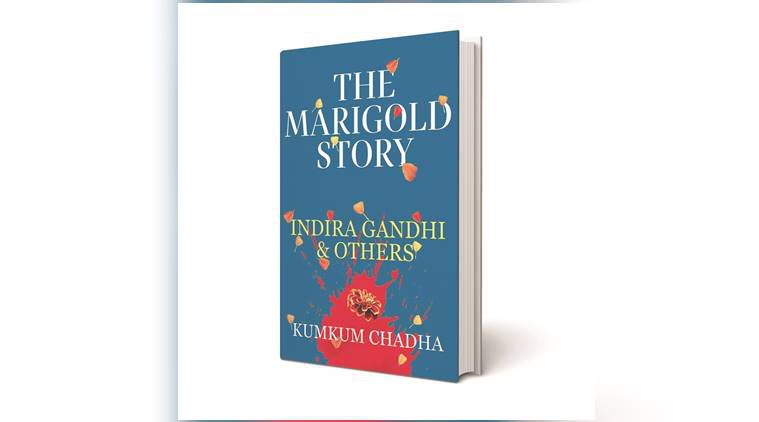- India
- International
Netsuke stories
Vignettes of a rarefied space of political power and celebrity from a seasoned journalist.
 Kumkum Chadha’s The Marigold Story is a collection of netsuke, whose beauty lies in how much they convey with so little.
Kumkum Chadha’s The Marigold Story is a collection of netsuke, whose beauty lies in how much they convey with so little.
The Marigold Story: Indira Gandhi & Others
Kumkum Chadha
Tranquebar
360 pages
Rs 699
‘Netsuke’ are miniature Japanese sculptures that distil the aura of a time and place so vividly that you are transported to another space, both familiar and distant. Kumkum Chadha’s The Marigold Story is a collection of netsuke, whose beauty lies in how much they convey with so little.
Chadha is a well-known journalist who has for decades enjoyed a close view of the power-play in Lutyens’ Delhi, and of the great drive — and greater foolishness — of many stars. Here, she has turned her microscope on them, to produce forensic, yet empathetic, accounts of persons who have dominated our imagination for decades. Chadha writes accessibly about their inner lives in the book:
Smita Patil, a new mother at 31 and India’s leading actress, brought her days-old baby from the hospital alone to the new apartment she had purchased off Mumbai’s Carter Road, to set up home with fellow actor Raj Babbar (now contesting the 2019 Lok Sabha elections). Joyless and despairing at her collapsing relationship, she did not perform the grihapravesh (house-warming) ceremony. She reached out to her friend, the author: “Kumkum, I have lost my will to live.” Within a week, Patil died of septicaemia related to pregnancy, broken-hearted and a victim of medical negligence. “Smita’s life was waiting endlessly: for perfect relationships, for that elusive happiness.” The reader wonders if celebrityhood leached the resilience that Smita would have inherited from her strong-willed parents — her father started as an agricultural labourer and her mother was a housemaid in Nashik.
Lalu Yadav has widely-splayed toes because he grew up without shoes. He often went without food, and survived on rodent chokha and curried wild rabbits. The village schoolteacher gave him basic lessons gratis, in lieu of odd jobs around the house. When he passed an exam, as gurudakshina, Lalu gifted the teacher a bit of rope, his only possession. Lalu’s journey, from a key player in Jayaprakash Narayan’s Sampoorna Kranti against Indira Gandhi’s corrupt regime to Jharkhand’s jails for conviction in corruption cases, is studded with seeming contradictions.

Chadha says that he often spoke about “gai, gobar, bael-gaadi” (cow, dung and bullock-cart), and yet claimed he achieved an unprecedented financial turnaround in the loss-making Railways, a ‘fact’ which was contradicted by his successors. Although he managed to foist his wife Rabri Devi as Bihar’s chief minister for 10 years, Lalu reminisced wistfully, “Kalank lagta hai. Pata nahin kya hai nakshatra mein. Har baar hota hai ki Lalu gaya, gaya, Lalu gaya, par har baar Lalu wapis aa jaata hai. Jo photo finish kar dena chahte hain, par photo toh mit-ta nahin” (“It is a slander campaign; something to do with my planetary alignment; every time there is talk of Lalu being finished, but he bounces back. The rivals want to finish him, but my identity is difficult to erase”). Now, over to May 23, when his Rashtriya Janata Dal and his squabbling family will be tested.
The genesis of the contemporary slogan, “Chowkidar chor hai”, lies in the late 1980s: “Gali gali mein shor hai, Rajiv Gandhi chor hai.” Astonishingly, we heard echoes of this slogan in Prime Minister Narendra Modi’s taunt to Rahul Gandhi on May 4, when Modi said that Rahul’s father had died as “Bhrashtachari No. 1”. Talking of the day Rajiv Gandhi was assassinated, Chadha notes that at Sriperumbudur, Rajiv had asked the security detail to let the young lady Dhanu meet him. “She struck with precision, placing a sandalwood garland around Rajiv’s neck. As he took it off as he always did, she bent down to press the button… a loud explosion ripped him and others apart”.
After 28 years, Rajiv Gandhi’s death in Sriperumbudur is convertible election currency, yet again. “Millions of ordinary Congress workers… are full of enthusiasm… But they are handicapped, for on their backs ride the brokers of power and influence, who dispense patronage to convert a mass movement into feudal oligarchy… They are reducing the Congress to a shell from which the spirit of service and sacrifice have been emptied…” — This is what Rajiv Gandhi had said in Mumbai in 1985. Chadha says, Rajiv had acknowledged that “ it was always the cabal, the coterie in the Congress who got the better of the sincere members. This perhaps explains the mediocrity that had gripped the system.”
The book notes that Rajiv Gandhi had nurtured his constituency Amethi keenly, with Sonia. In the years after Rajiv became its MP, “Amethi transformed from a village into an industrialised city, brightly-lit. Every village in the district had water and electricity, motorable roads.” Thursday, May 23, will reveal if Rajiv Gandhi laid enduring foundations in Amethi for his son, Rahul Gandhi, in the hearts of its people.
At the age of 25, Ajay Bijli decided to leverage the Indian love for movies and take it to dizzying international standards of movie-going. Without his transporter family’s approval, Ajay contacted Warner Brothers and Village Roadshow to invest in transforming the staid Priya cinema in New Delhi’s Vasant Vihar. His grandfather, an awe-inspiring wrestler, had once retrieved a Hindu girl from kidnappers in the aftermath of Partition — “Bijli ki tarah gaye or bijli ki tarah aaye” (went in like lightning and rushed out like lightning). And Bijli became the family surname.
Chadha has named her book after the marigold flowers that Indira Gandhi disliked — the very flowers that bedecked her bullet-riddled body as it awaited cremation. And yet, it is this chapter that Chadha is not as sure-footed as she is with Amitabh and Jaya Bachchan, Ekta Kapoor and Smriti Irani, Abhinav Bindra, LK Advani, Arun Jaitley and Sanjay Gandhi. As India awaits the election results, Chadha’s book tells some compelling back-stories, conveying the insight of Netsuke.
The writer is a senior journalist based in New Delhi.
Apr 26: Latest News
- 01
- 02
- 03
- 04
- 05




































